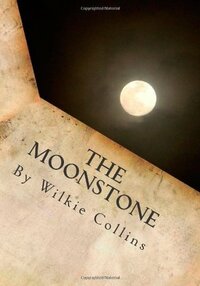Take a photo of a barcode or cover
The Moonstone represents everything that annoys me about Victorian literature. It is bloated, excessively wordy, and tries to generate a gripping plot while simultaneously offering too many trifling details. It feels as if Collins is trying to walk the line between literature and popular entertainment, but managing to bungle both. The novel is too light to be taken seriously, but also not quite sensational enough to qualify as a bit of fun guilty pleasure, such as one might find in gothic novels or the Challenger stories of Arthur Conan Doyle. And so, over the course of a year, I struggled through the various first-person narratives, realizing that the popularity of these types of novels was most likely due to their episodic nature and serialized publication schedule. If I had to wait a month or two before getting to the next narrative, then the reading experience may have been more tolerable. As it was, I had to take long periods between reading just to make it through, so I ended up reading the novel close to how it would have been read in the 1860s.
I now understand why, as a 20-year-old college student, I didn't read Collins' The Law and the Lady in a class on criminality in British literature. It was a memorable course with amazing readings, but Collins' novel was the only one I tossed aside without finishing (or even coming close). I thought that reading The Moonstone would cause me to gain an appreciation for Collins and want to return to The Law and the Lady. Instead, I feel as if I've vindicated my 20-year-old self. Maybe one day in the next decade I'll give The Woman in White a shot.
Maybe.
I now understand why, as a 20-year-old college student, I didn't read Collins' The Law and the Lady in a class on criminality in British literature. It was a memorable course with amazing readings, but Collins' novel was the only one I tossed aside without finishing (or even coming close). I thought that reading The Moonstone would cause me to gain an appreciation for Collins and want to return to The Law and the Lady. Instead, I feel as if I've vindicated my 20-year-old self. Maybe one day in the next decade I'll give The Woman in White a shot.
Maybe.
adventurous
funny
lighthearted
mysterious
medium-paced
Plot or Character Driven:
Plot
Strong character development:
No
Loveable characters:
Complicated
Diverse cast of characters:
No
Flaws of characters a main focus:
No
Collins, Wilkie. The Moonstone. 1868. Introduction by Alev Lytle Croutier. Afterword by Lilian Nayder. Signet, 2009.
Wilkie Collins must be the Rodney Dangerfield of popular Victorian novelists. You can take a pretty good course in the nineteenth-century novel and never read him. Dickens, Eliot, Thackeray, Trollope, Gaskell, and the Bronte sisters usually relegate his work to the optional reading list. And if you are doing the far ends of the century, he must also compete with Austen, Conrad, Wells, and Kipling. Nevertheless, one can make a case for The Moonstone. Even today, it is a page-turner of a who-done-it / how’d-he-do-it story. Collins borrows a lot of character technique from his buddy Charles Dickens. In fact, the character of Sergeant Cuff is a better detective than Dickens’ own Inspector Bucket from Bleak House. It is a better diamond-heist story than Trollope’s The Eustace Diamonds. And it looks forward to the sadly racist, very conflicted critique of English imperialism one finds in Joseph Conrad and Rudyard Kipling. Like Dickens, Collins took some chances with narrative structure. He revives the old epistolary novel form that allows him to have a slew of different storytellers, each with his or her own voice and point of view. Just so we get the idea, he has his first narrator read and reread Robinson Crusoe. Is it wrong to borrow a few chops from Charles Dickens? Nah. Otherwise, we would have to exile all those writers out there trying to be the next Stephen King or James Patterson.
Wilkie Collins must be the Rodney Dangerfield of popular Victorian novelists. You can take a pretty good course in the nineteenth-century novel and never read him. Dickens, Eliot, Thackeray, Trollope, Gaskell, and the Bronte sisters usually relegate his work to the optional reading list. And if you are doing the far ends of the century, he must also compete with Austen, Conrad, Wells, and Kipling. Nevertheless, one can make a case for The Moonstone. Even today, it is a page-turner of a who-done-it / how’d-he-do-it story. Collins borrows a lot of character technique from his buddy Charles Dickens. In fact, the character of Sergeant Cuff is a better detective than Dickens’ own Inspector Bucket from Bleak House. It is a better diamond-heist story than Trollope’s The Eustace Diamonds. And it looks forward to the sadly racist, very conflicted critique of English imperialism one finds in Joseph Conrad and Rudyard Kipling. Like Dickens, Collins took some chances with narrative structure. He revives the old epistolary novel form that allows him to have a slew of different storytellers, each with his or her own voice and point of view. Just so we get the idea, he has his first narrator read and reread Robinson Crusoe. Is it wrong to borrow a few chops from Charles Dickens? Nah. Otherwise, we would have to exile all those writers out there trying to be the next Stephen King or James Patterson.
adventurous
funny
mysterious
medium-paced
Plot or Character Driven:
Plot
Strong character development:
Yes
Loveable characters:
Complicated
Diverse cast of characters:
Yes
Flaws of characters a main focus:
No
I really enjoyed this for the most part, but at times it became a bit tedious. The ending was pretty satisfying, though, and I laughed out loud at many points. I could definitely see Dickens’s influence throughout, but - it’s not quite Dickens.
mysterious
slow-paced
Plot or Character Driven:
Plot
Strong character development:
No
Loveable characters:
No
Diverse cast of characters:
Complicated
Flaws of characters a main focus:
No
mysterious
medium-paced
Plot or Character Driven:
A mix
Strong character development:
Yes
Loveable characters:
Complicated
Diverse cast of characters:
Complicated
Flaws of characters a main focus:
Complicated
I was pleasantly surprised by this book. I always remember The Woman in White as being a bit dry and tedious (perhaps it suffered in comparison to the far more dramatic musical) and was torn between my desire to read the 'first true detective novel in the English language' and my hesitation to read anything else by Wilkie Collins.
I'm glad I finally just went for it, but it was quite entertaining, in much the same way an Agatha Christie or Sherlock Holmes would be. (It was also a bit more wordy and drawn out than either of those, and perhaps even a tinge more melodramatic, but as I don't mind the Victorian style, that didn't harm my enjoyment of the story.)
I am actually also glad I didn't read this at a much younger age though, because some of the narration is, not quite what I would call 'unreliable' but definitely 'biased', and a lot of the nuances of social interactions in that context would have gone over my head a decade ago.
I'm glad I finally just went for it, but it was quite entertaining, in much the same way an Agatha Christie or Sherlock Holmes would be. (It was also a bit more wordy and drawn out than either of those, and perhaps even a tinge more melodramatic, but as I don't mind the Victorian style, that didn't harm my enjoyment of the story.)
I am actually also glad I didn't read this at a much younger age though, because some of the narration is, not quite what I would call 'unreliable' but definitely 'biased', and a lot of the nuances of social interactions in that context would have gone over my head a decade ago.
Moderate: Suicide
Minor: Addiction, Colonisation
mysterious
slow-paced
Plot or Character Driven:
Plot
Strong character development:
No
Diverse cast of characters:
No
Flaws of characters a main focus:
No
Very wordy – if this were a modern book, it would probably be 1/3 that length. But 19th century writers did that, so… I really liked the cast of readers for the Recorded Books edition. The first & last chapters’ narrator was particularly delightful. I’m not sure I would have seen all the humor in those chapters if I had been reading it myself.
mysterious
adventurous
emotional
mysterious
slow-paced
Plot or Character Driven:
Plot
Strong character development:
Complicated
Loveable characters:
Yes
Diverse cast of characters:
Yes
This is perhaps one of the most poorly written books I have attempted to read in a very long time! I enjoy thrillers and mysteries, but The Moonstone was not getting the job done. The plot moved at a slow pace. The characters were uninteresting and poorly developed. When I finally accepted the fact that there are so many other books I would rather be reading at the moment, the choice to cut my losses became crystal clear in my mind. I’m not going to suffer through a book that I absolutely hate.





